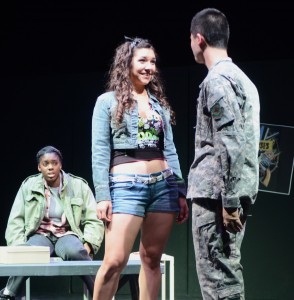
A few minutes in, a 17-year-old girl and her brother are left to fend for themselves. An hour and ten minutes later, three people are trapped in a courthouse after an earthquake.
These are not sequential events. These two scenes are instead parts of the two separate one-act plays featured in the School of Theater, Film and Television’s annual Francis Ford Coppola One-Act Marathon, running for a total of around two hours for three separate nights.
The marathon is named after celebrated director and UCLA alumnus Francis Ford Coppola. In 1998, Coppola agreed to be involved in an annual presentation of student work that brought graduate playwrights together with graduate film directors.
This year, for the first time in the event’s history, one of the featured plays, “Sweet Child,” is written by an undergraduate, fourth-year theater student Roxie Perkins.
Even though the marathon is intended to show the work of first-year graduate student playwrights, Perkins was approached by a participating professor and had the opportunity to stage her play this year because there is currently only one first-year graduate student playwright.
“This is definitely the most time and effort anyone else has given anything I’ve ever written,” Perkins said. “I’m just really grateful that they let me be involved, it’s not technically supposed to be for me.”
Perkin’s play follows a 17-year-old girl living in a city similar to Oakland, who is abandoned by her parents. She believes her father left four years earlier to fight in the Iraq War, and therefore plans to enlist when she turns 18 so she can find him. Before she does, she becomes captivated with another soldier who has recently returned home.
“It’s a lot about truth and lies and what a person needs to tell himself in order to survive in unpleasant situations,” said director of “Sweet Child” and graduate film student Moana Sherrill.
Unlike “Sweet Child,” the plot of “Fault Line,” directed by graduate film student Paul Reisinger, takes place over the course of a few hours. The play centers around three people in a courthouse for the trial of a man who killed someone in a car accident, but before the perpetrator can be revealed, an earthquake strikes, trapping the three in the basement of the courthouse.
The play explores what happens when the judiciary system is absent and people have to make decisions for themselves. Reisinger said working on the marathon was liberating because he had a larger amount of time to work with the theater actors and felt he really got to focus on directing.
“When you make a film, you are involved in pre-production, in the shoot and the editing process, so you have minute control over everything, you control what the audience is going to see,” Reisinger said. “In theater performances, it’s the actor’s show; they control what the audience sees and every performance is a little bit different.”
This is the first play Reisinger and Sherrill have directed. They both said staging their one-act plays for the marathon has helped them rethink their filmmaking processes, while also presenting them with new challenges they were unaccustomed to in filmmaking, such as creating a set design.
Sherrill said she learned a lot about theater direction, and she said staging her one-act has inspired her to spend more time with her actors while making her films.
“It’s so nice to sit and talk to them in a way that you usually don’t get a chance to in film, and I’d love to push to get more of that chance in the future,” Sherrill said.
